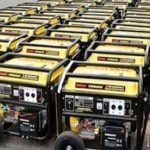The Importance of Emergency Generators: Reliable Power during Emergencies.
An emergency generator is a backup power source that is used to provide electricity during power outages or emergencies. It is a must-have device for homes, businesses, hospitals, and other critical facilities that cannot afford to lose power. In this article, we will discuss the different types of emergency generators, their benefits, and factors to consider when purchasing one.
Types of Emergency Generators
- Portable Generators: These are the most common type of generators and are designed to be moved from one location to another. They are typically powered by gasoline or propane and can provide power to small appliances and electronics.
- Standby Generators: These are larger generators that are permanently installed outside a home or business. They are typically powered by natural gas or propane and can provide power to an entire building or facility.
- Inverter Generators: These are smaller and more compact than traditional portable generators. They use advanced technology to produce a clean and stable power output, making them ideal for sensitive electronics.

Benefits of Emergency Generators
- Provides Power During Outages: The most obvious benefit of an emergency generator is that it provides power during outages, ensuring that critical appliances and equipment remain operational.
- Increases Safety: An emergency generator can provide power to essential safety equipment such as sump pumps, carbon monoxide detectors, and emergency lighting.
- Preserves Food: During a power outage, refrigerators and freezers can quickly lose their cooling capabilities, potentially leading to spoiled food. An emergency generator can provide power to these appliances, ensuring that food stays fresh.
- Increases Comfort: An emergency generator can provide power to air conditioners and heaters, keeping homes and businesses comfortable during power outages.
Factors to Consider When Purchasing an Emergency Generator
- Wattage: The wattage of an emergency generator will determine how much power it can provide. It is important to determine your power needs before purchasing a generator to ensure it can provide enough power to essential appliances and equipment.
- Fuel Type: Emergency generators can be powered by gasoline, propane, diesel, or natural gas. Each fuel type has its own advantages and disadvantages, so it is important to research each option before making a purchase.
- Noise Level: Generators can be loud, so it is important to consider the noise level when purchasing a generator, especially if it will be used in residential areas.
- Price: The cost of an emergency generator can vary significantly depending on its size and features. It is important to determine your budget and research different options before making a purchase.
- Installation: Standby generators require professional installation, while portable generators can be easily set up by the owner. It is important to consider the installation requirements when purchasing a generator.
- Maintenance: Like any other equipment, emergency generators require regular maintenance to ensure they remain operational during emergencies. It is important to consider the maintenance requirements and costs when purchasing a generator.
- Size: Emergency generators come in different sizes, ranging from small portable generators to large standby generators. It is important to choose the right size generator for your needs to ensure it can provide enough power during emergencies.
- Durability: Emergency generators are designed to withstand harsh weather conditions and long-term use. It is important to choose a generator that is durable and can withstand extreme temperatures, humidity, and other environmental factors.
- Brand and Warranty: It is important to choose a reputable brand that offers a warranty for their generators. This ensures that you can get support and replacement parts if needed.
- Safety Features: Emergency generators should be equipped with safety features such as automatic shut off, overload protection, and low oil shutdown to prevent accidents and damage to the generator.
Conclusion
An emergency generator is a must-have device for anyone who cannot afford to lose power during an outage or emergency. It provides power to critical appliances and equipment, ensuring the safety and comfort of homes, businesses, and other facilities. When purchasing a generator, it is important to consider the wattage, fuel type, noise level, price, and installation requirements to ensure you are getting the best generator for your needs. With proper research and planning, an emergency generator can provide peace of mind and reliable power during any emergency. In conclusion, an emergency generator is a crucial investment for anyone who wants to be prepared for power outages and emergencies. It provides reliable power to essential appliances and equipment, ensuring safety, comfort, and peace of mind during any emergency. When purchasing a generator, it is important to consider the wattage, fuel type, noise level, price, installation requirements, maintenance, size, durability, brand, warranty, and safety features to ensure you are getting the best generator for your needs. With proper research and planning, you can find the perfect emergency generator that will provide reliable power during any emergency.
